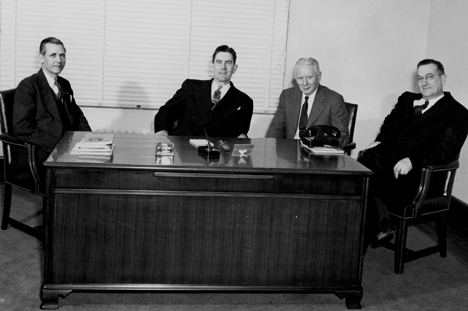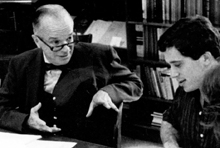50 Years Ago: 'A Donnybrook at Duke'
In 1960, an administrative battle set the stage for Duke's later growth

Fifty years ago this month, the Duke University administration imploded. The president resigned under pressure, the chief academic officer was dismissed, plots and counter-plots were hatched and emotions spilled out into local newspapers.
Largely unknown by those who now work and study on campus, the clash between President Hollis Edens and Vice President for Education Paul Gross was actually a key moment in Duke's subsequent emergence as a world-class institution. Behind the drama and personality conflicts lay deeper questions about the kind of university Duke should become and how it might best achieve its aspirations.
By the time the dispute was sorted out a few years later, Duke had enhanced rules for faculty governance, a more effective administrative and trustee structure and, most important, a more expansive vision of its own future.
"Duke University probably came out of it better off," former university archivist Bill King musing on the historic significance of the episode's 50th anniversary. "The university held its own through the Great Depression and World War II, but we needed higher salaries for the faculty, more buildings and a leadership for a new era. The old guard had run things for a long time. It was time for change. It's just the way it happened was unfortunate."

Duke's Historian
The fullest scholarship on the Gross-Edens affair was done by Duke historian Robert Durden (pictured left), author of several books and articles on the university and the Duke family. Much of the research for this story came from Durden's article. The article can be found in the July and October 1994 edition of The North Carolina Historical Review.
What Duke historian Robert Durden later called the "Donnybrook at Duke," was about five years in the making.
The principals were two of the major figures in Duke history. Hollis Edens, who assumed the presidency in 1949 at age 48, was nationally known for his previous work as an executive with the Rockefeller Foundation.
One of Edens' first decisions at Duke was to make Paul Gross vice president of education, the university's chief academic officer. Gross was an internationally respected chemistry researcher who had joined the Duke faculty in 1919 back when it was still Trinity College.
In a recent interview, Durden said the combination of the young outsider president and a long-time faculty member was effective at first. The university improved fund-raising and launched several important academic initiatives such as the Center for Commonwealth Studies and the Center for the Study of Aging.
But beginning around 1955, disputes between the two men became common.
Today their disagreements seem small. One memo in the University Archives, for instance, details complaints about the lack of screens on East Campus buildings and administrative reporting lines for a mid-level employee in the registrar's office.
But in Gross' opinion, all of these issues were part of a larger question of whether Duke was doing enough to take advantage of the rapid growth in higher education that occurred across the country after World War II. He was concerned how faculty salaries had suffered in the post-war inflation and saw a desperate need for Duke to develop new research facilities to match those at other institutions.
In a 1955 memo now in the University Archives, Gross protested that the academic sector was getting insufficient support. He cited "a lack of wholehearted cooperation from some of the other divisions of the university," specifically pointing to the business division.
Durden says it is unfair to say Edens didn't share Gross' desire for Duke to grow nationally, although that is how he is often portrayed in accounts of the conflict. In a 1994 journal article, Durden said the differences between them weren't insurmountable, arguing that "with goodwill and a sense of humor and proportion, the problems might have been worked out."
Nonetheless, as Tom Harkins, associate university archivist, notes, "the two men were basically unlike in perspective, temperament, outlook and educational philosophy."
In his article, Durden quotes Edens' assistant Earl Porter as saying, "Edens was not soft but thought that human beings came first." The president's weakness, according to Porter, was his "unwillingness to assume public leadership for the institution." Several key trustees shared this view, feeling Edens lacked the vision the presidency needed, Durden wrote.
The trustee executive committee crafted a temporary peace in 1958, expanding Gross' authority and putting him in charge of a long-range planning effort.
But that solution did not last long, in part because of a quirk in Duke's bylaws. Back in the early 1930s, then-President William Preston Few had written the bylaws to give The Duke Endowment (TDE) trustees an influential role on the executive committee of the university trustees. According to Durden, Few believed the arrangement would prevent divisions between the Duke and TDE boards.
But in 1960, Durden writes, the rule resulted in divisions between the executive committee and the full board, where appointees from the Methodist Church still had a strong base.
Gross had the ear of TDE board members on the executive committee, who made crucial decisions without support from the full board, Durden said. Meanwhile, Edens remained popular with many faculty members and trustees, particularly those appointed by the church.

Trustee Thomas Perkins
Matters came to a head in February 1960. Thomas Perkins, who in late 1959 became the chief TDE representative on the university trustee executive committee, sought to force Edens into the vacant position of chancellorship. On February 19, Edens announced his resignation. The reason, which Edens worked out with the executive committee, was that he was stepping aside so a new president could come aboard at the beginning of the long-range planning process that would set Duke's direction for the next decade.
The announcement surprised most of the campus, including many members of the trustee board, recalls Durden, who was then a young faculty member.
"Faculty didn't know any of this," Durden said. "The main business of the university went on, regardless of what was happening at the top echelons. The faculty didn't know the true story at the time."
In the lack of accurate information, many theories swept the campus. Stories appeared a week later in the Winston-Salem and Greensboro newspapers quoting anonymous sources as saying Gross and allies on the executive committee had pushed out Edens -- news that outraged many faculty members and trustees.
A faction of faculty members supporting Edens pushed for his return. A letter from one supporter decried a "power play of great force and effectiveness" led by an opposition whose "power of rationalization is beyond calculation."
The articles put pressure on Gross to respond. A day before the March 23 trustee meeting, he granted an interview with the Durham Morning Herald. While not naming Edens, Gross said some leaders at Duke wanted to maintain the status quo instead of growing Duke. Later, he claimed he did the interview to defend himself against "libelous and defamatory attacks against my reputation and character," which he attributed to an "organized campaign of calumny."
The Herald interview was too much for those trustees who still supported Edens. They planned a rebellion at the trustee meeting the next day, wrote Durden, who had access to the meeting's notes.
The meeting started with Edens admitting the reason for his resignation was staged but adding that he resigned because of disagreements with the executive committee and "for the best interest of the university."
The pro-Edens faction on the board then demanded that Gross be questioned. Brought before the board, Gross spoke about his hopes for the long-range planning effort. A single question was asked about the Herald interview. After Gross left the room, he was dismissed by a vote of 26-5, Durden wrote.
Gross' dismissal added confusion to an already tense situation on campus. Many faculty members were furious that the entire top layer of academic administration had been swept aside in one month without their knowledge. TDE trustees blasted the Duke board. Durden quoted one as saying, "Well, we tried to run [the university], and they didn't like it. Now let them run it."
In the short run, there was more sympathy for Gross than for Edens, Durden said. "A lot of faculty bought the spin job Gross had pulled about him having a national vision," Durden said. "I think the majority of the faculty including myself were highly sympathetic to Gross. He was the senior member of the faculty."
But in the long run, the main consequence was that Duke took several steps that helped set the sharp upward trajectory it would follow over the next several decades. Dr. Deryl Hart took over as interim president and quickly won support to have the "interim" removed from the title. A management report led to administrative changes. Taylor Cole became the first faculty member to officially hold the title of provost, a position formally established in the bylaw changes of 1962.
Also in 1962, Duke established the Academic Council, which strengthened faculty governance. Changes to the trustee board helped restore the strong working relationship that has continued until the present day among the university, The Duke Endowment and the Methodist Church.
Even as this month's anniversary provides a reminder about their historic dispute, both Edens and Gross have been remembered much more over the past half-century for their many accomplishments during their 12 years as university administrators according to Durden. In 1968, their names were again paired, for more positive reasons, when the Board of Trustees honored both by naming a residential quad after Edens and a new chemistry building after Gross.